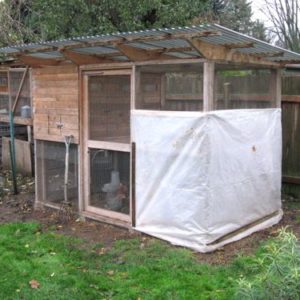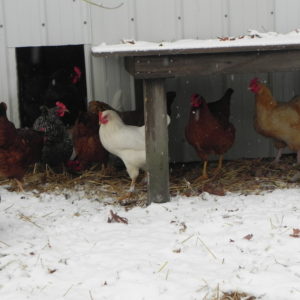The Coop: Do a thorough cleaning of the coop, sprinkle FOOD GRADE Diatomaceous Earth (available at feed stores) on coop floor & in nesting boxes, before spreading bedding. This helps prevents mites. I use the deep lite r method to keeping the coop cleaner and to keep odors down. I usually start out with about 3-4 inches of pine shavings as a base. I have found that the flake type of pine shavings work best in both the nesting boxes and for the coop floor year round. In the Fall, I also bag up several bags of dried leaves from maple & oak trees to use in the winter for the deep litter method. (Make sure not to use Black Walnut or Cherry tree leaves, or any other poisonous leaves.) Rake the bedding around to fluff it up a bit, before adding about 2-4 inches of equal amounts of fresh pine shavings and leaves. (As needed.) The leaves are free, help prevent packing, and as they decompose they help keep odors down. In the Spring when you clean the coop, this deep litter can be used in your gardens.
r method to keeping the coop cleaner and to keep odors down. I usually start out with about 3-4 inches of pine shavings as a base. I have found that the flake type of pine shavings work best in both the nesting boxes and for the coop floor year round. In the Fall, I also bag up several bags of dried leaves from maple & oak trees to use in the winter for the deep litter method. (Make sure not to use Black Walnut or Cherry tree leaves, or any other poisonous leaves.) Rake the bedding around to fluff it up a bit, before adding about 2-4 inches of equal amounts of fresh pine shavings and leaves. (As needed.) The leaves are free, help prevent packing, and as they decompose they help keep odors down. In the Spring when you clean the coop, this deep litter can be used in your gardens.
The Run: If you have a chicken run, you may want to use tarps to keep snow & wind out, so your chickens can enjoy being out in fresh air if the temperature isn’t frigid. I tarp the roof and 3 sides of the run. This allows sun and fresh air in the area.
Food & Water: Use your normal feed, but note that the chickens may eat a bit more, as they need more calories to keep themselves warm. Our chickens eat chicken friendly table scraps and scratch feed as a treat, besides their normal layer feed. I continue this in the winter, but on extra cold days, I may fix them some warm oatmeal, which they seem to appreciate. Water is of utmost importance. You must make sure they have access to water that isn’t frozen. If you have electric in your coop you can purchase heated bases, waterers or dog dishes. If you do not have access to electricity, you will have to give them fresh water 2-3 times a day to make sure they have access to water. You can add vitamins & electrolytes to their water to give a boost to their health in the winter. (available at feed stores)
Lighting: In the winter months, we lose a few hours of natural light, which will have an affect on egg production. (Which gives the layers a bit of a natural break.) If you have electricity in the coop, you can add light time in the coop which will help with their egg production. There are 2 schools of thought on adding light or not. I do use lights to keep egg production up. I add an hour in the morning and an hour & a half at dusk, with no problems.
DO NOT USE HEAT LAMPS, to keep your chickens “warm,” it does the opposite and can cause their combs to freeze. It puts moisture in the air and makes the bedding damp/wet, besides the chance of fire. Chickens need good ventilation to stay healthy and keep ammonia levels down, which can make chickens sick with respiratory problems that can lead to death. I leave the windows in my coop open about ½ -1 inch all winter. This allows more ventilation, but no real drafts.
Access To The Outdoors: We pasture our chickens all year. During the winter months, they enjoy being outside, hanging out at the barn or under the barn overhang which is tarped to keep the w ind & snow out. If the temperature or wind chill drops below 20 degrees the chickens stay in the coop, to prevent frostbite to combs & wattles. Vaseline can be put on combs & wattles to help prevent frostbite.
ind & snow out. If the temperature or wind chill drops below 20 degrees the chickens stay in the coop, to prevent frostbite to combs & wattles. Vaseline can be put on combs & wattles to help prevent frostbite.
Chicks: Chicks must be kept at 90 degrees working down to 75 degrees for the first few weeks, therefore, I do not recommend getting new chicks from November through the end of February. If you choose to get chicks during these months you must have an area to meet these temperatures or you will lose your chicks. If using a heat lamp in your barn, coop, or elsewhere, make sure it is secured extremely well, so it cannot be knocked down, etc….This will cause a fire. A personal friend lost his whole barn, boarding facility, dogs, cats, and chicks due to a knocked over heat lamp. Spring, Summer, and Early Fall are the best times to get new chicks.
Eggs: Collect your eggs 2 times a day if possible, to prevent eggs from freezing.
Preventing Boredom: Since the chickens are in the coop more in the winter, they may get bored, so you can hang a mirror up at floor level, buy a parrot toy, or CD discs for them to peck at, buy some meal worms as a treat, throw some scratch feed on the coop floor, buy some spinach, herbs, or other greens for them as a treat, or hang a cabbage for them to peck at.
Predators: Food sources for predators are limited in the Winter months, so maintain your vigilance to keep your flock safe.
I hope these random tips will help you keep your chickens healthy, safe, & comfortable during the Winter months. I can be contacted via email, ynotllamas@aol.com for further information.